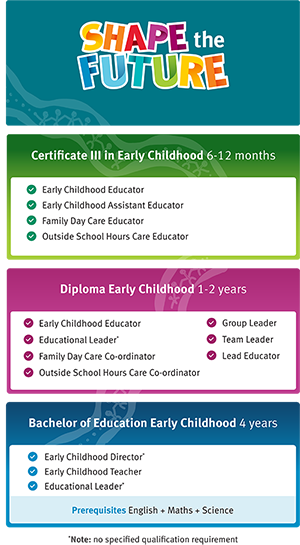 Early childhood services must employ staff who hold, or are studying towards, a nationally approved qualification to comply with the
National Quality Framework. While different service types have slightly different requirements, there are generally 3 levels of
nationally approved qualifications to work in early childhood. These are as follows:
Early childhood services must employ staff who hold, or are studying towards, a nationally approved qualification to comply with the
National Quality Framework. While different service types have slightly different requirements, there are generally 3 levels of
nationally approved qualifications to work in early childhood. These are as follows:
- Certificate III
- Diploma
- Bachelor Degree or higher.
The Australian Children’s Education and Care Quality Authority (ACECQA) is the national body responsible for approving and publishing the
lists of all relevant qualifications for educators working in the early childhood education and care sector across Australia.
If you are currently studying a qualification, check if it is on the approved qualifications list.
If you hold a qualification that is not on the approved qualifications list, you can apply to ACECQA to have it
assessed for equivalence.
Your qualification and experience will generally determine your position within an early childhood service. This diagram provides some examples of possible role titles you could take on with each qualification level.
Early childhood teachers (ECTs) require a nationally approved bachelor's degree or higher with an early childhood specialisation. Each university or higher education provider will have their own qualification titles and subject selections. You can study online or on campus if you prefer.
The steps to become an early childhood teacher are similar to becoming a school teacher. In fact, some nationally approved ECT qualifications also enable you to teach in the early years of school.
Note: Outside school hours care (OSHC) qualifications are broader in range than just early childhood. An educator can be 1-year or 2-year qualified or equivalent, in an approved area of study such as nursing, sport and recreation or behavioural science. For example, you can work as an OSHC educator while you are studying your bachelor's degree in behavioural science.